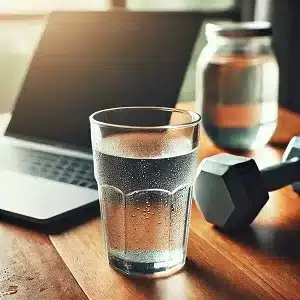You’ve heard it a million times: “Drink eight glasses of water a day.” But is that really the magic number? Not quite. The amount of water you need depends on who you are, what you do, and how you live your life.
Some people need more. Some need less. And the truth is, your hydration needs change daily. So instead of following generic advice, let’s break it down into something practical—something that fits your lifestyle.
The Science of Hydration: Why Water Matters
Water isn’t just about quenching thirst—it’s about keeping your body functioning at its best. It regulates temperature, fuels digestion, lubricates joints, and powers your brain. Even slight dehydration can lead to fatigue, headaches, and poor concentration.
The Institute of Medicine suggests men need about 3.7 liters (125 oz) and women need about 2.7 liters (91 oz) of water daily—but that includes fluids from food and other beverages, not just plain water.
Now, let’s get into what you actually need based on your daily habits.
How Much Water Do You Need? Lifestyle-Based Breakdown
1. The Active Individual: Athletes, Gym-Goers, and Fitness Enthusiasts
If you’re sweating, you’re losing water—and that needs to be replaced. A good rule of thumb:
- Drink an extra 16–24 oz of water for every hour of exercise.
- If you sweat heavily, add electrolytes to maintain balance.
- Pre-hydrate by drinking 16 oz before a workout.
- Replenish with another 16 oz after.
Pro Tip: Weigh yourself before and after a workout. For every pound lost, drink 16–20 oz of water to rehydrate.
2. The Desk Warrior: Office Workers and Remote Professionals
Sitting all day doesn’t mean you don’t need water. Dehydration can sneak up on you, leading to brain fog and sluggishness.
- Aim for 8–10 cups (64–80 oz) per day.
- Keep a water bottle within reach and sip consistently.
- If you drink coffee or tea, increase water intake—caffeine can have a mild diuretic effect.
- Set reminders to drink water if you often forget.
3. The Busy Parent: Multitaskers and On-the-Go Individuals
Parents barely have time to sit down, let alone think about hydration. But dehydration can lead to fatigue, making an already exhausting job even harder.
- Carry a water bottle wherever you go.
- Drink a full glass in the morning to start strong.
- Hydrate between meals instead of only at mealtimes.
- Add natural flavors like lemon or lime to make it more appealing.
4. The Frequent Traveler: Commuters and Jet-Setters
Planes, long drives, and constant movement can lead to dehydration fast. Dry air in airplanes, especially, pulls moisture from your body.
- Drink at least 8 oz per hour on flights.
- Avoid excessive caffeine or alcohol, which can dehydrate you.
- Opt for water-rich foods like fruits and veggies.
- Pack an easy-to-carry water bottle for refills on the go.
5. The Night Owl: Late Workers and Those Who Stay Up Late
If your day starts when the sun goes down, hydration is still just as crucial. Your metabolism and brain function rely on it.
- Start with 16 oz as soon as you wake up.
- Sip water throughout the night, but avoid excess before bed.
- If you consume energy drinks or caffeine, drink extra water to balance it out.
Signs You Need More Water
If you’re still unsure if you’re drinking enough, watch for these dehydration signals:
- Dark yellow urine (aim for pale yellow)
- Dry mouth or lips
- Headaches
- Fatigue
- Dizziness
- Muscle cramps
The Bottom Line
Forget one-size-fits-all water advice. Your hydration needs depend on your activity level, environment, and daily habits. Listen to your body, sip consistently, and adjust as needed.
A simple rule? Drink when you’re thirsty, and don’t wait until dehydration kicks in. Your body will thank you.

